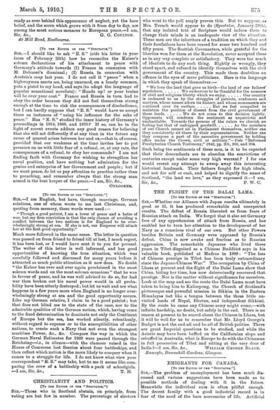[To TEM EDITOR OF THE " SPECTATOR. "] SIR,—I should like
to ask " E. S." (vide his letter in your issue of February 26th) how he reconciles the Kaiser's solemn declarations of his attachment to peace with Germany's attitude towards (1) France in connexion with M. Delcasse's dismissal ; (2) Russia in connexion with Austria's coup last year. I do not call it " peace " when a highwayman meets me, being unarmed, on a lonely common, puts a pistol to my bead, and says (to adopt the language of popular sensational novelists) : " Hands up ! or your brains will be over your coat." France and Russia in turn had to obey the order because they did not feel themselves strong enough at the time to risk the consequences of disobedience, but I can hardly suppose that "E. S." would have us accept these as instances of " using his influence for the sake of peace." Has " E. S." studied the inner history of Germany's proceedings in 1864, 1866, and 1870 P If so, can he in the light of recent events adduce any good reason for believing that she will act differently if at any time in the future any cause of quarrel arises between her and us,—that is, of course, provided that our weakness at the time invites her to put pressure on us with little fear of a refusal, or, at any rate, th6 consequences of a refusal, to obey her commands P I am not finding fault with Germany for wishing to strengthen her naval position, and have nothing but admiration for the genius and enterprise of her Government and people ; but if we want peace, do let us pay attention to practice rather than to preaching, and remember always that the strong man armed is the best keeper of the peace.—I am, Sir, &c.,
ONLOOKER.














































 Previous page
Previous page